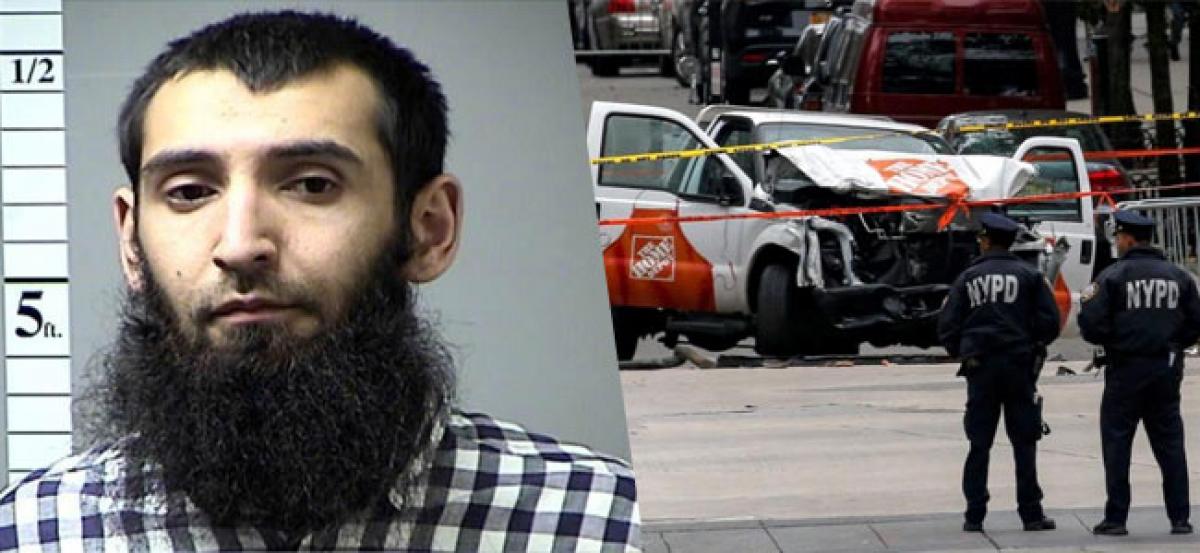Live
- Apple’s Lightning-to-3.5mm Headphone Adapter May Be Discontinued
- Kishan Reddy Slams Telangana Government, Criticizes Congress and BRS
- Lawyers demand urgent implementation of Protection Act
- Cotton farmers protest fraud in weighing process
- Faculty allegedly rags 1st yr student at Govt Med College
- Mini libraries at tribal welfare hostels soon
- Range-bound trading on positive bias
- Weekly, daily MACD shows strong bearish momentum
- Markets hovering in directionless mode amid lack of triggers
- Epilepsy: Spreading awareness & inspiring support
Just In

An Uzbek immigrant accused of killing eight people in New York by driving a rental truck down a bike path became interested in religion after emigrating to the United States, a fellow Uzbek who spoke to him two months ago told Reuters.
TASHKENT/ALMATY: An Uzbek immigrant accused of killing eight people in New York by driving a rental truck down a bike path became interested in religion after emigrating to the United States, a fellow Uzbek who spoke to him two months ago told Reuters.
U.S. police declined to publicly identify the suspect, but a source familiar with the investigation said his name was Sayfullo Saipov, 29.
He had emigrated to the United States in 2010, U.S. media reported. CNN said he had left a note saying he carried out the attack in the name of Islamic State and had shouted “Allahu Akbar” - Arabic for “God is greatest” - after the violence.
“He became religious on the spur of the moment,” Mirrakhmat Muminov, a truck driver and Uzbek community activist who lives in Stow, Ohio, told Reuters by phone.
He said Saipov had previously lived in Tashkent, the capital of Uzbekistan.
“He started studying religion in the United States,” said Muminov, adding that Saipov “couldn’t get enough” of the religious freedoms enjoyed in the United States after living in the strict confines of Uzbekistan.
In Uzbekistan, an authoritarian, predominantly Muslim country in Central Asia ruled by Moscow until the collapse of the Soviet Union in 1991, the practice of Islam is tightly controlled by a government wary of radicalism.
Tuesday’s attack shines an uncomfortable light on Islamist militancy in Central Asia which has supplied Islamic State in Syria and Iraq with thousands of fighters. If the attacker’s identity is confirmed, it would be at least the fourth deadly attack by an Uzbek national or ethnic Uzbek this year.
Muminov said Saipov had lived in Stow two or three years ago, that they had met through the local Uzbek community, and that Saipov had also worked there as a truck driver.
‘AGGRESSIVE LONER’
Muminov said he had heard about the attack from members of the local Uzbek community, some of whom he said were getting ready to be questioned by the authorities.
He said he had no first-hand information about whether Saipov had carried out the attack and painted a picture of a man who was struggling to make it in the United States, had few friends, and poor communication and English language skills.
”He was withdrawn, nervous, sometimes aggressive. Because of that he was lonely, he lived in his own world. He was not very popular,” said Muminov. He said Saipov’s English was poor and he did not speak Russian very well. Muminov said he had last spoken to Saipov about two months ago.
In a letter of condolence to President Donald Trump on Wednesday, Uzbek President Shavkat Mirziyoyev said Uzbekistan was ready to use “all its resources” to help investigate the New York attack.
It was the bloodiest single attack on New Yorkers since the Sept. 11, 2001, suicide hijackings of jetliners steered into the World Trade Center. It poses a challenge for Mirziyoyev, who assumed office at the end of 2016 and is trying to slowly open up his country after decades of authoritarian rule.
On New Year’s day, an Uzbek gunman burst into a nightclub in the Turkish city of Istanbul and killed 39 people. In April, an ethnic Uzbek man born in Kyrgyzstan blew up a metro train in the Russian city of St Petersburg, killing at least 14 people, and that same month an Uzbek man rammed a truck into a crowd in Stockholm, killing four people.

© 2024 Hyderabad Media House Limited/The Hans India. All rights reserved. Powered by hocalwire.com







